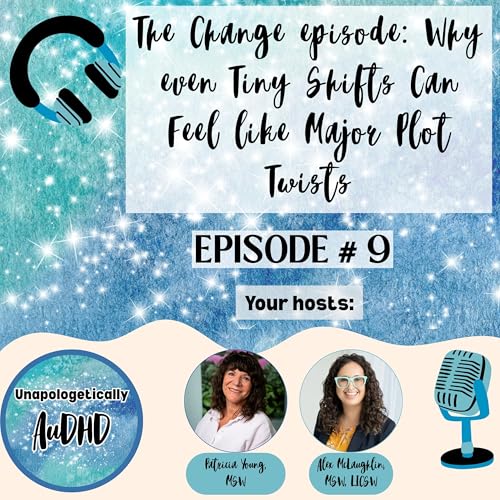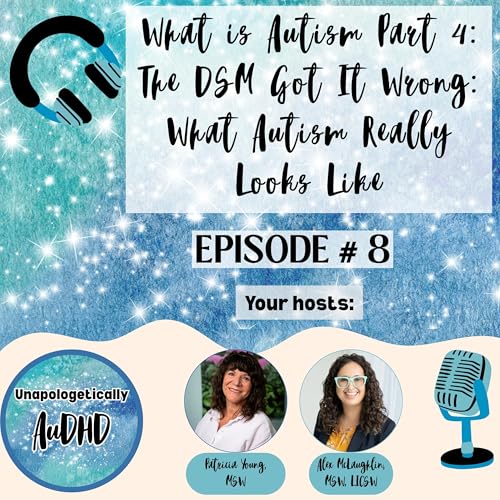9. The Change Episode: Why Even Tiny Shifts Can Feel Like Major Plot Twists SUMMARY This episode explores why managing change can feel so intensely dysregulating for autistic and AuDHD folks. Patricia (she/her) and Alex (they/them) talk openly about post-holiday burnout, the emotional and sensory cost of social expectations, and the internal pressure to appear flexible even when our nervous systems are screaming for predictability. helm — and they offer compassionate, practical ways to support yourself through it. At its heart, this conversation is about honoring your wiring, trusting your needs, and creating more permission to navigate change on your own terms. BRIEF EPISODE SUMMARY This episode digs into why change—big or small—can feel overwhelming, exhausting, or destabilizing for autistic and AuDHD folks, even when the change is positive or desired. Patricia and Alex talk about post-holiday burnout, sensory overload, emotional fatigue, and the crash that happens after pushing through social expectations. Patricia explores the internalized pressure to be "easygoing," the shame around needing predictability, and the resentment that builds when needs aren't voiced directly. Patricia and Alex break down how inconsistency, unpredictability, and last-minute shifts can send the nervous system into overdrive. Alex and Patricia share practical, compassionate strategies for navigating change: pacing, lowering expectations, sensory supports, scripting, noticing your body's needs, and honoring what actually helps instead of what you think you "should" be able to handle. Ultimately, the episode is about self-trust, emotional honesty, and building a life that respects your neurodivergent wiring — especially during seasons of chaos, transition, and holiday noise. KEY TAKEAWAYS Autistic sensory and emotional fatigue after holidays ("harvest feast" instead of Thanksgiving). How pace points/spoon theory help track energy during social and holiday events. Autistic overwhelm from holiday prep, socializing, and changes in routine. The emotional impact of not being direct about needs (resentment vs depression). Feeling "grinchy" and why the Grinch may resonate with autistic and AuDHD folks. Autistic need for sameness, repetition, and predictability for nervous-system regulation. How even positive change can be dysregulating for autistic people. Overwhelm from visual clutter and environmental shifts (decorations, bedding, etc.). The emotional exhaustion of people coming and going in a household. Autistic challenges with transitions, unexpected additions/subtractions of people, and last-minute plan changes. How autistic people mentally prepare and why sudden changes feel destabilizing. Internalized ableism and external criticism around being "rigid," "negative," or "not chill." How trauma, masking, and accuracy needs affect responses to change and inconsistency. Partner dynamics around inconsistency, communication, and misremembered conversations. Observing family dynamics that others don't notice — a common autistic experience. Post-holiday shutdown mode: pajamas, no shower, comfort foods, and rest. Shame around "basic adulting" when autistic burnout hits. Chronic fatigue, post-exertional malaise, and the overlap with AuDHD burnout. How habits, sensory items, comfort objects, and small routines restore predictability. Strategies for managing change: reducing expectations, movement, comfort shows, pacing, sensory support, and compassion. SOUNDBITES Even things that you enjoy can be dysregulating and overwhelming, and change can be difficult." "I think what I call depression is really resentment for not being direct." "If someone could respond differently, they would. We're not choosing to have difficulty with change." "Inconsistency is very difficult for me — it's not about the tree, it's about the mismatch." "Change really affects me. I overdid it, and now my body is telling the truth." ABOUT YOUR HOSTS: Alex McLaughlin (they/them) has a Master's in Social Work, and is a licensed independent clinical social worker (LICSW) on Wahpekute land (colonized as MN). Alex is an AuDHDer, PDAer, Queer, non-binary, fat, chronically ill, disabled, & a multi-racial (1/8th Chinese & white passing) human with lived experience of OCD. As a late diagnosed adult, Alex has felt different and embraced their quirky, eccentric nature—what they now recognize as undiagnosed AuDHD. This lifelong experience of masking and curiosity about people inspired their passion for understanding and serving others, ultimately shaping their path today. Alex provides neurodivergent and Queer-affirming therapy and Autism and ADHD assessments on Wahpekute land (colonized as Minnesota). Their work is grounded in intersectional feminism, ecological systems theory, and a commitment to decolonizing mental health care. They support clients in exploring how interconnected systems shape their experiences, while ...
続きを読む
一部表示

 35 分
35 分 35 分
35 分 49 分
49 分

